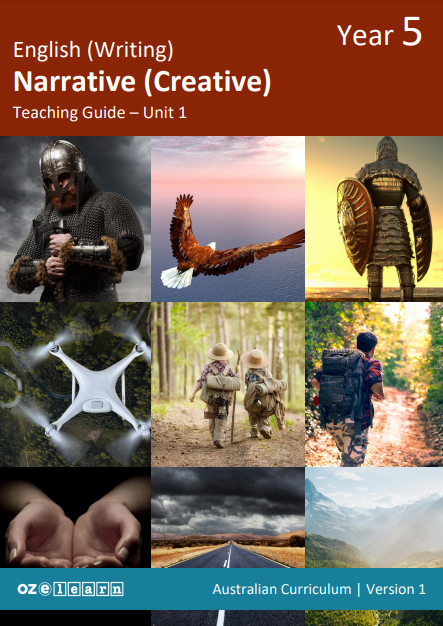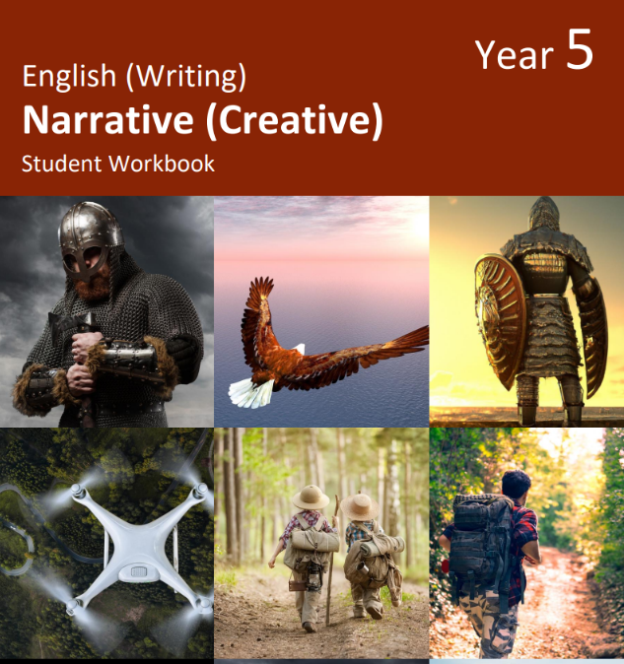Unit 1: Narrative (Creative) Year 5
Oz-e-Writing

Overview
Oz-e-writing Year 5 Narrative (Creative) is a writing unit for Year 5 students. It aligns to the Australian Curriculum V9.0.:
- Becoming familiar with the typical stages and language features of types of texts such as narrative, procedure, arguments, explanation, discussion and informative texts, and how they can be composed in written, digital and multimedia forms to achieve their purpose. (AC9E5LA03)
- Describing the stages and phases, and purposes of narratives, historical recounts, procedural recounts, causal explanations, discussions of alternative positions on an issue, information reports, reviews and types of poems. (AC9E5LA03)
- Observing how descriptive details can be built up around a noun or an adjective, forming a group (for example, ‘this very smelly cleaning cloth in the sink’ is a noun group and ‘as pretty as the flowers in May’ is an adjective group). (AC9E5LA06)
- Identifying language features such as use of dialogue and rich descriptive language, and presenting an opinion about their effect on readers. (AC9E5LE02)
- Discussing why an author might choose a particular point of view. (AC9E5LE03)
- Discussing how figurative language including simile and metaphor can make use of a comparison between different things. (AC9E5LE04)
- Drawing upon fictional elements in a range of model texts; for example, main idea, characterisation, setting (time and place) and devices; for example figurative language (simile, metaphor, personification) to experiment with new, creative ways of communicating ideas, experiences and stories in literary texts. (AC9E5LE05)
- Creating a visual map, which may include digital mind maps, of figurative language, storylines, characters and settings in a text that may inspire their own writing. (AC9E5LE05)
- Participating in pair, group, class, school and community speaking and listening situations including informal conversations, discussions, debates and presentations. (AC9E6LY02)
Success Criteria
- Understand the purpose of an epic.
- Identify the stages of an epic.
- Understand different perspectives in writing.
- Write sentences from the first-person and third-person point of view.
- Brainstorm a Hero’s backstory.
- Write a paragraph about the Hero.
- Jointly plan the stages of an epic.
- Independently plan the stages of an epic.
- Develop your understanding of the settings in the first stage of an epic.
- Identify settings in an epic.
- Identify vocabulary and meaning of the text.
- Identify the elements of each stage of an epic.
- Build vocabulary about the setting, characters and events of an epic.
- Jointly write descriptive sentences about the setting, characters and events in a epic.
- Independently write descriptive sentences about the setting, characters and events in an epic.
- Jointly rewrite the exemplar text creating descriptive paragraphs about the setting, characters and events in an epic.
- Independently rewrite the exemplar text creating descriptive paragraphs about the setting, characters and events in an epic.
- Add verbs to describe the Hero’s thoughts and emotions.
- Add similes to develop descriptions.
- Include metaphors to create vivid descriptions.
- Adds expanded noun groups to make descriptions more vivid.
Learning objectives
In Lessons 1 to 40, students learn about the purpose and universal structure of an epic.
- Stage 1 – The Hero.
- Stage 2 – Need.
- Stage 3 – Go.
- Stage 4 – Search.
- Stage 5 – Find.
- Stage 6 – Take.
- Stage 7 – Return.
- Stage 8 – Change.
Teaching resources
- lessons
- Teaching Guide
- Student Workbook
- Student Assessment Booklet.
Assessment
Progress tests
Progress Tests are conducted in weeks 3 and 6, allowing teachers to monitor student understanding and to identify where reteaching is needed.
The Teaching Guide contains the testing questions and answers, and the Student Assessment Booklet has a section where students write their answers. Marking guides are provided in the PowerPoints, Student Assessment Booklet and the Teaching Guide.
End-of-unit assessment
The end of unit assessment is an application of writing skills taught in the unit combined content covered throughout the unit.
APPLE questions throughout lessons provide teachers with the opportunity to assess student understanding and drive classroom discussions.



Responses